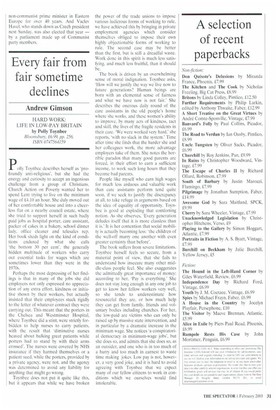Every fair from fair sometime declines
Andrew Gimson
HARD WORK: LIFE IN LOW-PAY BRITAIN by Polly Toynbee Bloomsbury. £6.99, pp. 256. ISBN 0747564159
Polly Toynbee describes herself as 'profoundly anti-religious', but she had the energy and curiosity to accept an ingenious challenge from a group of Christians. Church Action on Poverty wanted her to spend Lent trying to live on the minimum wage of £4.10 an hour. She duly moved out of her comfortable house and into a cheerless flat on a nearby council estate, where she tried to support herself in such badly paid jobs as hospital porter, care assistant, packer of cakes in a bakery, school dinner lady, office cleaner and telesales rep. Her book sheds light on the kind of conditions endured by what she calls 'the bottom 30 per cent', the generally hidden multitude of workers who carry out essential tasks for wages which are sometimes lower than they were in the 1970s.
Perhaps the most depressing of her findings is that in many of the jobs she did employers not only expressed no appreciation of any extra effort, kindness or initiative shown by their workers, but actually insisted that their employees stuck rigidly to the letter of whatever contract they were carrying out. This meant that the porters in the Chelsea and Westminster Hospital, where Toynbee did a stint, were strictly forbidden to help nurses to carry patients, with the result that 'diminutive nurses heaved about hulking great patients while porters had to stand by with their arms crossed', The nurses were covered by NHS insurance if they harmed themselves or a patient sued, while the porters, provided by a private agency, were not, and the agency was determined to avoid any liability for anything that might go wrong.
Toynbee does not put it quite like this, but it appears that while we have broken the power of the trade unions to impose various ludicrous forms of working to rule, we have achieved this by bringing in private employment agencies which consider themselves obliged to impose their own highly objectionable forms of working to rule. The second case may be better than the first, but is still a dreadful waste. Work done in this spirit is much less satisfying, and much less fruitful, than it should be.
The book is driven by an overwhelming sense of moral indignation. Toynbee asks, 'How will we justify the way we live now to future generations? Human beings are born with an elemental sense of fairness and what we have now is not fair.' She describes the onerous daily round of the care assistants in the old people's home where she works, and these women's ability to improve, by many acts of kindness, tact and skill, the lives of the fragile residents in their care. 'We were worked very hard,' she reports, 'with no slack in the system.' Time after time she finds that the harder she and her colleagues work, the more advantage employers take of them. She notes the horrible paradox that many good parents are forced, in their effort to earn a sufficient income, to work such long hours that they become bad parents.
People like myself who earn high wages for much less arduous and valuable work than care assistants perform tend quite soon, if we seek to justify, the discrepancy at all, to take refuge in arguments based on the idea of equality of opportunity. Toynbee is good at exploding that comforting notion. As she observes, 'Every generation deludes itself that it is more classless than it is.' It is her contention that social mobility is actually becoming less: 'the children of the well-off marry one another with even greater certainty than before'.
The book suffers from severe limitations. Toynbee herself feels so secure, from a material point of view, that she fails to understand how insecure many other middle-class people feel. She also exaggerates the admittedly great importance of money: according to her, 'Pay is everything.' She does not stay long enough in any one job to get to know her fellow workers very well, so she tends to underestimate how resourceful they are, or how much help they can get from family, friends and voluntary bodies including churches. For her, the low-paid are victims who can only he raised up by massive state intervention, and in particular by a dramatic increase in the minimum wage. She notices 'a conspiratorial democracy in minimum-wage jobs', but she does so, and admits that she does so, as an outsider, and one who is in too much of a hurry and Lou much in earnest to waste time making jokes. Low pay is not, however, a very good joke, and it is hard to avoid agreeing with Toynbee that we expect many of our fellow citizens to work in conditions which we ourselves would find intolerable.


























































 Previous page
Previous page